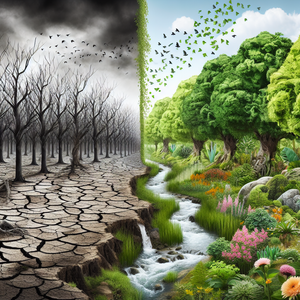The Intersection of Technology and Sustainability at Ecolab

Ecolab's commitment to sustainability is vividly illustrated through its strategic application of technology to tackle significant environmental issues. The company prioritizes initiatives aimed at reducing water usage, minimizing waste, and lowering energy consumption. One of the standout innovations is Ecolab’s digital water management solutions, which provide real-time monitoring and analytics. These tools empower industries to optimize water usage and detect leaks early, preventing costly waste and conserving vital resources. For instance, by utilizing data analytics, Ecolab has helped clients in the manufacturing sector reduce water usage by up to 30%, demonstrating not only environmental responsibility but also significant cost savings. In addition to water management, Ecolab employs artificial intelligence (AI) and machine learning (ML) to revolutionize clients' approach to sustainability. By analyzing extensive datasets, Ecolab assists organizations in identifying inefficiencies in their processes, thereby significantly reducing their environmental footprint. For example, AI algorithms can predict equipment maintenance needs, which helps prevent unplanned downtime and associated resource wastage. This proactive approach enhances operational efficiency while supporting sustainability goals.
Emerging Technologies and Innovations
Several groundbreaking technologies are driving Ecolab's sustainability initiatives. Among these is the development of advanced cleaning and sanitizing products that utilize fewer resources and have a reduced environmental impact. Ecolab has introduced formulations designed to minimize the need for water and energy during cleaning processes, thereby contributing to overall resource conservation. For instance, their products have been formulated to be effective at low temperatures, which not only conserves energy but also reduces greenhouse gas emissions associated with heating water. Another transformative innovation is the integration of robotics and automation in cleaning operations, particularly in sectors like foodservice and healthcare. These technologies enhance operational efficiency while ensuring compliance with stringent hygiene standards, thus promoting a safer environment for consumers and workers alike. For example, the use of autonomous cleaning machines in large facilities has led to significant labor savings and improved cleaning efficacy, further underscoring Ecolab's commitment to sustainability.
Career Opportunities in Tech-Savvy Sustainability
As Ecolab continues to innovate at the intersection of technology and sustainability, it is creating a wealth of career opportunities for tech-savvy individuals. Roles such as sustainability data analysts, environmental engineers, and technology integration specialists are now in high demand. These positions not only require robust technical skills but also a deep-seated passion for sustainability, making them particularly appealing for individuals eager to contribute to positive environmental change. Ecolab also emphasizes interdisciplinary collaboration, drawing on expertise from various fields—software development, environmental science, and business strategy—to drive innovative solutions. Aspiring candidates should focus on cultivating a diverse skill set that encompasses both technological proficiency and sustainability practices. This approach not only enhances career prospects but also positions professionals to make meaningful contributions to Ecolab’s mission of sustainability.
The intersection of technology and sustainability at Ecolab is more than a passing trend; it signifies a fundamental shift in how industries perceive and enact environmental responsibility. Through the strategic use of innovative technologies, Ecolab is leading the charge toward a more sustainable future while simultaneously opening up exciting career pathways for individuals eager to engage with this mission. As the global demand for sustainable practices continues to escalate, the fusion of technology and sustainability will undoubtedly play a pivotal role in shaping the workforce of tomorrow. Whether you are an aspiring professional or a seasoned expert, the evolving landscape at Ecolab offers a unique opportunity to be part of a transformative movement that prioritizes both people and the planet. Embracing this intersection means being at the forefront of progress, driving change, and contributing to a more sustainable world.
Sustainability Data Analyst
Ecolab, Deloitte, Siemens
Job Description
Analyze and interpret data related to resource consumption, waste generation, and environmental impact for various industries.
Develop and maintain dashboards that visualize key sustainability metrics and trends.
Collaborate with cross-functional teams to identify areas for improvement in sustainability practices.
Required Skills
Proficiency in data visualization tools (e.g., Tableau, Power BI)
Strong analytical skills
Experience with statistical analysis software (e.g., R, Python)
Environmental Engineer
Ecolab, AECOM, CH2M Hill
Job Description
Design and implement solutions for managing waste and minimizing environmental impact in industrial processes.
Conduct environmental impact assessments and regulatory compliance audits for projects.
Collaborate with clients to develop sustainable engineering solutions that meet both operational and environmental standards.
Required Skills
Knowledge of environmental regulations
Proficiency in CAD software
Strong problem-solving abilities
Technology Integration Specialist
Ecolab, IBM, Accenture
Job Description
Oversee the implementation of advanced technologies, such as AI and IoT, in sustainability-focused projects.
Act as a liaison between technical teams and business stakeholders to ensure technology solutions align with sustainability goals.
Provide training and support to staff on new technologies and tools related to sustainability practices.
Required Skills
Strong project management skills
Experience with software integration
Deep understanding of sustainability principles
Robotics Process Automation (RPA) Engineer
Ecolab, Boston Dynamics
Job Description
Design and develop robotic solutions that automate cleaning and maintenance processes in industrial settings.
Collaborate with engineering teams to enhance the efficiency and effectiveness of cleaning operations using robotics.
Conduct testing and troubleshooting of automated systems to ensure compliance with safety and hygiene standards.
Required Skills
Proficiency in RPA tools (e.g., UiPath, Automation Anywhere)
Programming skills (e.g., Python, C#)
Knowledge of cleaning industry standards
Sustainable Product Development Specialist
Ecolab, Unilever, Procter & Gamble
Job Description
Lead the research and development of eco-friendly cleaning and sanitizing products, focusing on minimal resource usage and environmental impact.
Conduct market analysis to identify trends and opportunities for sustainable product innovation.
Collaborate with marketing and sales teams to effectively communicate the sustainability benefits of new products to clients.
Required Skills
Experience in product formulation
Knowledge of green chemistry principles
Strong project management capabilities


